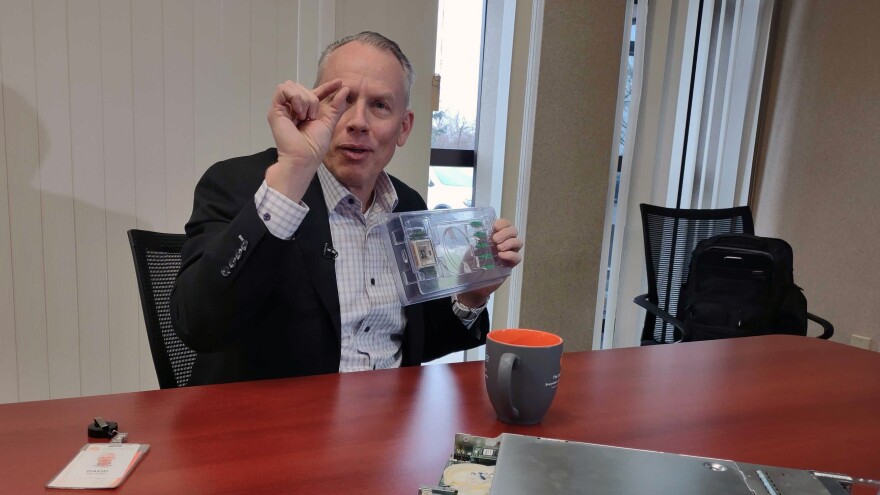UPPER MACUNGIE TWP., Pa. — U.S. Sen. Bob Casey, D-Pa., on Friday renewed his call for the U.S. government to invest in stateside semiconductor companies, after touring a Lehigh Valley facility that has produced the technological marvels for about 20 years.
Casey's call, after a tour of the Infinera packaging facility, comes as the federal government opens its first round of funding opportunities under the CHIPS and Science Act, a bipartisan $54 billion investment in semiconductors and other science fields.
- U.S. Sen. Bob Casey, D-PA, toured the Infinera packaging plant inn Upper Macungie Township on Friday
- The company produces optical semiconductors in California and ships them to the Lehigh Valley, where they're secured in packaging for use in lidar, broadband and other applications
- Casey named Infinera as great potential partner for the federal government as it looks to boost domestic production of semiconductors
The act intends to boost American production of computer chips and other essential technologies so it can better compete with other countries and won't need to rely on importing an essential piece of most modern technology.
While California and its Silicon Valley is the hub of America's semiconductor industry, Casey went to bat for the Keystone State as an ideal location for investment.
He said he dropped Infinera's name in a letter he sent to U.S. Commerce Secretary Gina Raimondo last week as an example of what can be accomplished.
"I think the United States government would be wise to make these kinds of investments in places like Allentown, Pennsylvania," Casey said.
"And not just because I represent it, but because it's clear what's happening here. You're literally seeing the invention of the future we all hope to achieve."
'Our No. 1 competitor is China'
The possibilities certainly have the full attention of Infinera's executives.
Chief Executive Officer David Heard, who caught a red-eye flight from California for a chance to speak with Casey for a few minutes, said the company needs to expand to compete with foreign companies.
Company officials were under intense pressure five years ago to move overseas to lower production costs, Heard said, and he views the CHIPS Act as a way to level the playing field.

"Our number one competitor is Huawei in China," Heard said. "They're spending at 50 times our rate and it's sponsored by the Chinese government. This is a great way to help accelerate technology."
Casey focused many of his comments Friday on the China, which he called an economic adversary.
American companies have fueled China's rise over the past few decades by moving electronics production into its borders, he said. Now, the United States faces a national security risk if it can't create the technology that enables the high speed traffic of information that our modern society relies on.
"We can't just wish away what China has been doing. You have to act and invest. You have to give companies like this the tools and resources they need to outcompete China or any other country in the world."U.S. Sen. Bob Casey
"We can't just wish away what China has been doing," he said. "You have to act and invest. You have to give companies like this the tools and resources they need to outcompete China or any other country in the world."
Infinera's success
Casey also hailed the positive impact growth could bring to the local economy. Staff in the packaging plant range from employees with two-year degrees who operate million-dollar machines to engineers who design the production process, said Darrell Engle, Infinera's vice president of global manufacturing.
Infinera produces indium phosphide semiconductors used in broadband, lidar, lasers and other technology. Its customers include the U.S. Defense Department, major telecom companies such as Verizon and AT&T, and internet content providers such as Netflix and Meta, company officials said.
Infinera's semiconductor wafers are produced in San Jose, CA. Some are sold directly to customers while others are shipped to the Lehigh Valley, where they're packaged into casings that will protect it from vibrations, heat, contaminants and other threats so they can operate for 15 to 20 years, Engle said.
U.S. Rep. Susan Wild, D-Lehigh Valley, has repeatedly pitched the Lehigh Valley as the perfect location for CHIPS Act investment. The region's transportation infrastructure, manufacturing heritage and cluster of colleges and universities make it a perfect location for technological innovations, Wild said.


